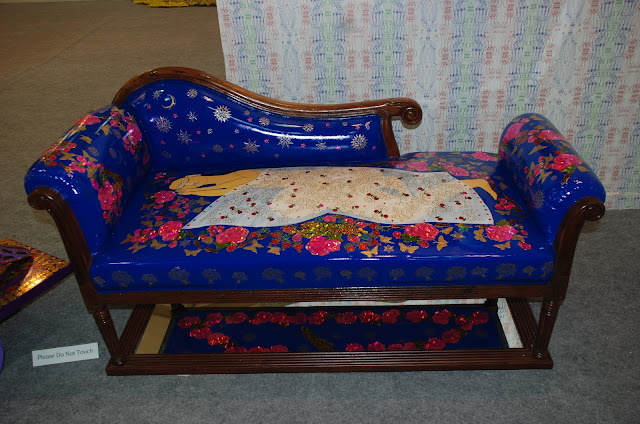A big burly man, my very first encounter with Peter de Francia was when he introduced himself to me on the narrow corridor of the painting department at the Royal College of Art, in the twilight of the afternoon, on a rather grey day of October in 1982 in London. In the preambles that followed I called him "Professor de Francia" only to be lifted into the air and commanded in a booming voice to call him Peter! I chose the RCA out of a number of admissions I had secured because I wanted to study under this legendary teacher, whose reputation had reached the class rooms where I studied at Baroda, all those miles across the oceans.
Peter loved all that was Indian. We shared a very special relationship during the years I was his student because he recognised that I was my own person, unwilling to secede to the conformity's of traditional norms, nor seek to adapt to the prevailing ideas of ethnic belonging as constituted by the Asian immigrant communities in Britain. He was a non-conformist too who cared very little for the acceptance of others if it interfered with the truth of his own beliefs.
Not a man to suffer fools easily, he demolished many a false ego amongst the posturing attitudes of those art students whom he perceived to be lacking in substance. Dressed in his self appointed uniform of a blue serge jacket and trousers coupled with a blue and white checked shirt on most days, this man of many seasons despaired over my pedestrian tastes of drinking coke with fine French cuisine! I smoked cigarettes and he smoked a pipe....and both of us had strong beliefs that governed our personal politics. He packed a punch when he needed to with me, and I stamped my foot and stood my ground on many occasions, making him smile behind the portrayed severity that he loved to wear as his mask.
Coming from a learning space in India that had done very little to encourage the journey of my feminist enquiry, both as a woman and as an artist, I was taken by surprise by his immediate comprehension that never required of me any explanations or validation. Insistent that I must expose myself to the art and culture of Europe in the two years I was a scholarship student; I would find detailed travel itineraries in my letter box, before each vacation approached, that virtually sent me back packing without further ado. Hand written and with notes on the art that he thought was significant for me to view, I was obliged on my return to have discussions with him that would often turn out to be feisty argument on perception and philosophical interpretations. His provocation to scratch at your conscience never destroyed your spirit if you were not yellow livered, and Peter loved nothing better than brains and guts as a combination in his students.
He always protected the foreign students from the subtle bigotry that being an outsider can sometimes attract; and he felt personally in need to apologise to us on our arrival at the RCA that the British Government took triple the tuition fee from foreign scholars. It was these attitudes that gave shape to his politics. Sometimes it also led to rather embarrassing situations in the 80's, where because of his marxist beliefs, he priced his art at ludicrously low prices, and as a result his students works were almost always more highly priced than his! But he just puffed on his pipe unperturbed, as he lived life on his own terms.
On an occasion when we had had a rather combustible discourse over David Hockney and Philip Guston's work that ended in me flouncing off in a temper tantrum of sorts; I returned to my studio a few hours later to find a drawing of a woman reclining and a male attendant fanning her! This was the delightfulness of this amazing man who possessed such a vast wisdom from the sharpness of his intellect, and carried a belly of rumbling laughter; that together formed this towering figure who held you accountable to your own conscience at all times.
Peter de Francia died a few days ago in London. However for me he has always lived in the spirit of who I am and I know that he will continue to live on even after I pass away; because his legacy is part of a history of learning that has no end.


















